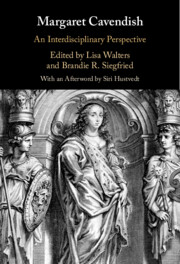Book contents
- Margaret Cavendish
- Margaret Cavendish
- Copyright page
- Contents
- Illustrations
- Notes on Contributors
- In Memoriam
- Acknowledgments
- Introduction
- Part I History of Science
- Part II Philosophy
- Part III Literature
- Chapter Eight Of Webs and Wonder
- Chapter Nine The Blazing World
- Chapter Ten Margaret Cavendish’s Prudence; or, Preservation and Transformation in Playes (1662) and Plays, Never Before Printed (1668)
- Chapter Eleven Lady Newcastle’s “Unsoiled Petticoats” and the Literary Reputation of Margaret Cavendish, 1652–1985
- Part IV Politics
- Part V New Directions
- Afterword
- Chronology of Works by Margaret Cavendish
- Select Bibliography
- Index
Chapter Ten - Margaret Cavendish’s Prudence; or, Preservation and Transformation in Playes (1662) and Plays, Never Before Printed (1668)
from Part III - Literature
Published online by Cambridge University Press: 28 April 2022
- Margaret Cavendish
- Margaret Cavendish
- Copyright page
- Contents
- Illustrations
- Notes on Contributors
- In Memoriam
- Acknowledgments
- Introduction
- Part I History of Science
- Part II Philosophy
- Part III Literature
- Chapter Eight Of Webs and Wonder
- Chapter Nine The Blazing World
- Chapter Ten Margaret Cavendish’s Prudence; or, Preservation and Transformation in Playes (1662) and Plays, Never Before Printed (1668)
- Chapter Eleven Lady Newcastle’s “Unsoiled Petticoats” and the Literary Reputation of Margaret Cavendish, 1652–1985
- Part IV Politics
- Part V New Directions
- Afterword
- Chronology of Works by Margaret Cavendish
- Select Bibliography
- Index
Summary
This chapter explores Cavendish’s career as a dramatist by examining the similarities and differences between her two volumes of drama, Playes (1662) and Plays Never Before Printed (1668). One of the plays in the 1668 volume, The Sociable Companions; or the Female Wits, recycles and adapts characters and plot – the story of a character called Prudence and her search for a husband – from The Publick Wooing, a play included in the 1662 volume. This pair of plays provides an opportunity to trace Cavendish’s response to changing theatrical conditions, while also revealing the flexibility of her principles of dramatic composition. By reworking the character of Lady Prudence in The Public Wooing in her later play, Cavendish explores the possibilities and limitations of prudence as a virtue available to women. Further, her recycling of this plot from one play to another reveals the prudential thinking that underlies her own writing and publication practices. Plays Never Before Printed includes two dramatic fragments – “A Piece of a Play” and “Scenes” from The Presence – that highlight the potential for transformation inherent in Cavendish’s dramatic works.
Keywords
- Type
- Chapter
- Information
- Margaret CavendishAn Interdisciplinary Perspective, pp. 158 - 172Publisher: Cambridge University PressPrint publication year: 2022



